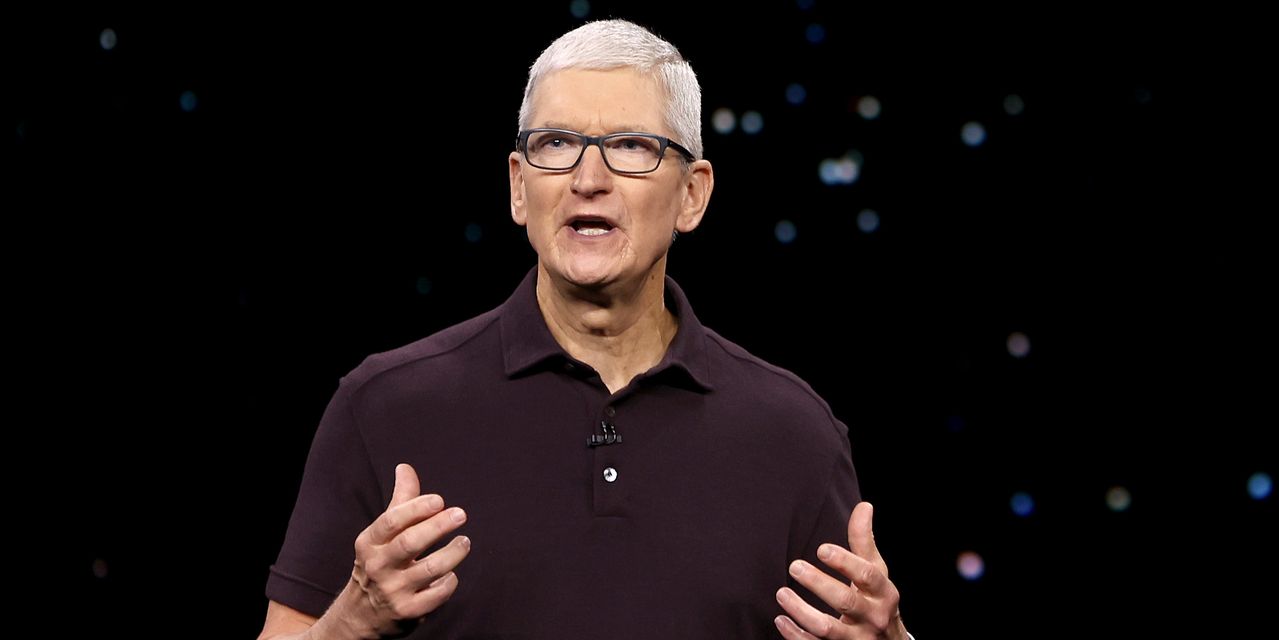Apple
has always been immensely proud of its home base in Cupertino, Calif. Many of its products —including the MacBook Air I’m using to write this article—have the words “designed by Apple in California.”
In 2016, the company published a book called “Designed by Apple in California,” with 450 images of Apple products, all designed in the Golden State.
But my MacBook also notes that it was “assembled in China,” and, in fact, the company remains hugely reliant on production of both components and finished goods manufactured in China and other Asian nations.
In the current climate of geopolitical tensions between the U.S. and China, and ongoing fears that China could one day move to take control of Taiwan, there is growing pressure on Apple (ticker: AAPL) to rely more on parts and manufacturing in the U.S.
And that helps explain Apple’s sudden burst of nationalist pride.
On Tuesday, Apple announced a new “multiyear, multibillion-dollar agreement” with the chip maker
Broadcom
(AVGO), to develop 5G radio frequency components and other wireless connectivity components. That includes parts called FBAR filters—an acronym for “thin-film bulk acoustic resonators”—which are included in every smartphone. Apple said the FBAR filters “will be designed and built in several key American manufacturing and technology hubs, including Fort Collins, Colorado, where Broadcom has a major facility.”
Wedbush analyst Dan Ives said in an interview that this is obviously a “plant the flag” moment for Apple, in response to pressure to boost domestic sourcing.
Broadcom has been an Apple supplier for years, and previous reporting suggests the company has long been supplying Apple with FBAR filters. This is not the sort of thing Apple typically announces, and the company generally frowns on suppliers discussing their relationship with the company.
Skyworks Solutions
(SWKS), another radio chip provider, relies on Apple for more than half of its revenue, but tiptoes around using Apple’s name. On the company’s most recent earnings call, Skyworks said that in March “the largest customer” was 64% of revenue. Not once did the company utter the word “Apple” on the call.
Every year, Apple publishes a list of component suppliers. The latest list, released last fall, includes more than 180 companies, which it says together accounted for 98% of the company’s spending on parts, manufacturing, and assembly in the September 2021 fiscal year. As The Wall Street Journal noted at the time, 48 of those companies had sites in the U.S., up from 25 a year earlier. Broadcom is on the list, citing locations in the U.S., South Korea, Taiwan, and Israel.
To be sure, Apple has been making a push to boost U.S. manufacturing for some time now. In April 2021, Apple announced plans to invest more than $430 billion over five years in U.S. production, and the following month announced awards from its “Advanced Manufacturing Fund” to II-VI, now called
CoherentCorp.
, for optical components, and another to Corning tied to new tougher cover glass for the iPhone. Last fall, Apple said a new satellite-based emergency calling feature included in iPhone 14 was funded by $450 million from the fund, with most of that going to the satellite company
Globalstar
(GSAT).
In the text of its Broadcom announcement, Apple said it was “on pace to meet its target through direct spend with American suppliers, data center investments, capital expenditures in the U.S., and other domestic spend.”
Apple declined to comment on the announcement beyond the press release.
Broadcom shares are 2.2% higher on the announcement, while other mobile phone components are slightly lower, with Qualcomm (QCOM), Skyworks and
Qorvo
(QRVO) all off 1% or less. Apple shares are down 0.6%.
Write to Eric J. Savitz at [email protected]
Read the full article here



